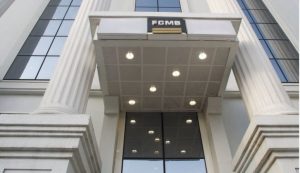60% LDR: How stock price of sanctioned banks decline on NSE

By Temmy Adebayo
Following the sanction of 12 commercial banks operating in the country by the Central Bank of Nigeria (CBN), the stock price of five out of the affected lenders on Thursday depreciated on The Nigerian Stock Exchange (NSE).
The apex bank on Wednesday debited 12 banks who failed to meet the initial deadline of 60 per cent Loan to Deposit Ratio (LDR) by September 30, 2019, in line with the penalty stipulated in the initial circular.
Zenith Bank Plc was penalized; N135.6 billion; United Bank for Africa (UBA), N99.7 billion and FBN Holdings Plc, N74.7 billion were the worst hit of the 12 sanctioned banks.
ther listed banks on NSE sanctioned by CBN include Guaranty Trust Bank plc, N25.1 billion and FCMB, N14.4 billion.
The share price of FBN Holdings was the most affected, shedding 1.82 per cent or N0.10 to close at N5.40 from N5.50 followed by FCMB that reported a decline 1.25 per cent or N0.02 to N1.58 from N1.60 it opened for trading on Wednesday.
The share price of Zenith bank also dropped by 0.82 per cent or N0.15 to N18.25 while the share price of GTBank traded flat on Thursday at N27.00.
Analysts at CardinalStone Research said, “In line with its recent drive to stimulate domestic economic growth by igniting bank lending, the Central Bank of Nigeria CBN has taken a raft of actions to achieve its goal over the last few days.
According to the Lagos based company report, “The CBN is serious! The decision to not only increase the minimum LDR requirement but also penalize banks that failed to meet the initial deadline suggests that the CBN is very deliberate about its plan to support growth. With CBN’s body language suggesting limited scope for rate cuts in the near term, we believe that the apex bank is being strict on the enforcement of regulatory measures to enhance credit creation
“The CBN’s assessment is likely based on overall net stable funding, not just deposits. It appears that the CBN uses a broader definition of the LDR, which encapsulates other sources of funds such as borrowings, shareholders’ funds, and deposits.
“This, possibly, explains why a bank like FCMB, which had an LDR of 75.1per cent at the end of H12019, was also penalized. As at H1 2019, the bank’s loan to funding ratio was at 51.7per cent.
This may also partly explain Zenith bank’s early redemption of part of its $500 million Eurobond in September
“Banks will likely be antsy in their strategies to grow loans. The new measures are also likely to force banks to anxiously re-evaluate their loan growth strategies. Based on the H1 2019 numbers of our coverage banks, only Access Bank (+37.8per cent – reflecting the impact of its merger with Diamond Bank), Fidelity Bank (+15.8per cent), and Stanbic IBTC Holdings Plc(+six per cent) reported YTD loan growths. Unsurprisingly, none of these banks was negatively impacted by the recent sanction
“Asset quality concerns may re-emerge. We see this as a possibility given the prevailing weakness in macro fundamentals, which likely explains banks’ cautious approach to loan growth. With the near term outlook for most consumer and manufacturing firms looking largely unfavourable on the back of recent fiscal measures, we believe that a desperate push to increase lending could lead to growth in non-performing loans.”









